How to always be a prepared facilitator – with workshop ideas in your pocket
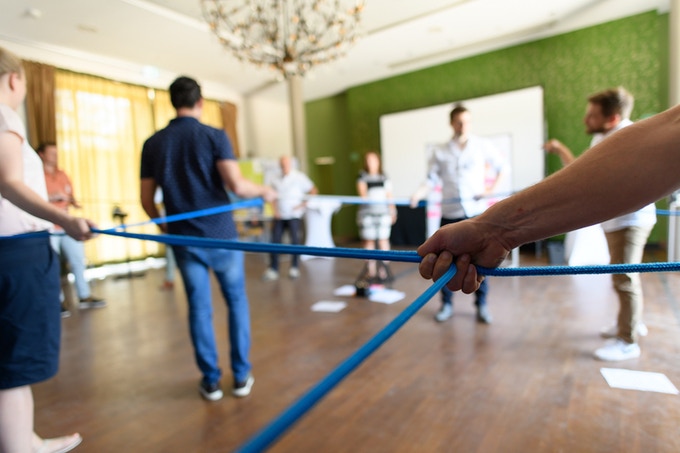
Running effective meetings takes lots of preparation. When planning a workshop agenda, it’s easy to worry that you’ll run out of ice breaker activities or be unprepared should you suddenly need to take your agenda in a different direction during your session.
Nadja Petranovskaja knows this all too well. Having originally trained as a psychologist, Nadja worked in a number of different positions at Daimler, IBM, Airbus and PriceWaterhouseCoopers. In her different roles as a consultant, project manager or within HR, Nadja ran regular internal training sessions for her colleagues where she shared her knowledge and skills.
“Initially, my biggest challenge was to handle the group dynamics. As a facilitator, if you’re uncertain and inexperienced, the group can take over.”
However, after she completed some additional training and learnt more about successful facilitation methods, she found her biggest challenge was to choose from all the different possible techniques.
“I remember I used to carry seven different books with me, and I always made an effort to try to read some of them the night before the workshop. Sometimes it was tricky to decide from all the possibilities which exercise or model I wanted use. Plus, when all the digital resources came about, it made the decision even harder!”
After struggling for some time, Nadja came up with a solution which meant she never felt underprepared or overwhelmed by all the workshop activity options: WonderCards.
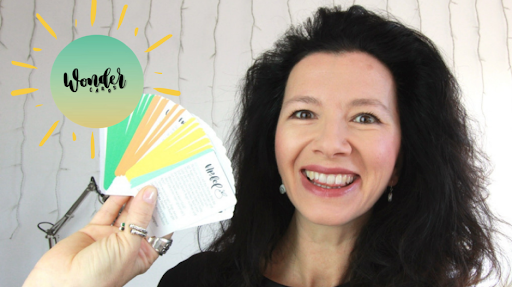
The ‘easy workshop activity’ concept
Nadja Petranovskaja’s WonderCards began as a family project and developed into a successful Kickstarter campaign. Now, the cards have finally been produced and they’ll ensure you always have a backup idea in your pocket to give you inspiration during workshop planning and design.
“You can literally use them anytime, anywhere, especially if your planned path doesn’t work out and you quickly need a Plan B” comments Nadja.
But what exactly are WonderCards and how did they come to be?
In 2011, Nadja became an independent entrepreneur, focused on developing others’ presentation skills, creating facilitation methods, and making organisations fit for the future. However, Nadja continued to struggle with all the different possible models, exercises and ideas, and she began to recognise that some of these techniques and exercises didn’t actually require additional material or preparation. This is the moment that the idea for WonderCards was born.
Nadja’s very first version of WonderCards were a handwritten version of survival methods which she could use anytime and anywhere that a quick facilitation idea was needed. “When I started to use them regularly, I realised how much time I was saving every week! I also began to wonder if colleagues of mine might find this kind of ‘facilitation survival kit’ useful.”
“Then my daughter saw the cards and instantly deemed them ‘ugly’. It was a few weeks before Christmas so I asked if she would like to help me make them prettier. She was doing a lot of hand lettering in those days, so she designed some pretty headlines for the cards.”
The second, family hand-drawn version of the WonderCards looked like this:
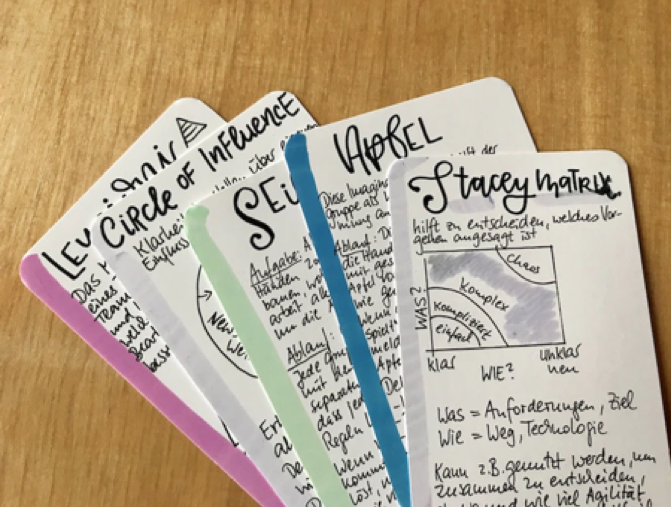
By chance, Nadja discovered a local print shop where she could print a set for herself. She posted her card-creation story on LinkedIn, and quickly gained a lot of interest from her network. Nadja suggested the idea of co-creating the concept and bringing it to life, and together with a group of fifty test users they developed what is now the ultimate must-have collection of methods, tools and techniques for every facilitator: WonderCards.
The facilitation method cards
You can use the cards when designing your agenda, for spontaneous agenda changes or when you need ideas for some quick team building activities.
In the WonderCards kit, you’ll find a set of forty cards with powerful exercises, useful models and fresh formats & methods which you can use in any workshop, training & meeting.
On each card, you’ll find the method you’ll need to run each activity. It has all the information you need, including duration, group size, how-to, debriefing recommendations and sometimes a short link to additional information. And yes, that’s all on one card!
The kit covers all phases of a session: there are exercises for a sparkling warm up and introduction, methods for deeper structured reflection and analysis, energizers for fun and motivation and tools to round it all up, highlighting results and achievements.There are also two blank cards for you to design your own favourite exercises and seven bonus cards with formats you can literally use anytime and anywhere, especially for those moments where you need to quickly come up with a ‘Plan B’.
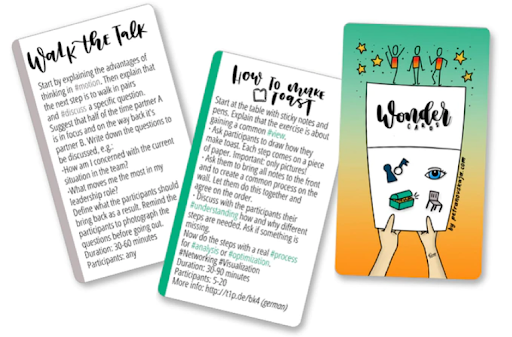
Nadja began a Kickstarter campaign to begin developing the cards, and following its success, Nadja produced sets of standard-size cards in German and English. This evolved into the production of larger tarot-size cards for people who would like a bigger font or who simply prefer to hold something more solid in their hands.
And the feedback so far?
“Sometimes we receive posts on LinkedIn or Twitter from customers telling us about their fantastic experience using WonderCards. Most people like the fact that you can design a whole session (even with several days!) with the WonderCards. Others like the new concepts and ideas. Some love that the cards are so small, you can take them with you everywhere – even if you’re working alongside your clients and want to let them co-design the session!”
Using WonderCards online
Considering using WonderCards while planning your workshop online?
Nadja has added a number of her WonderCard activities to the SessionLab library, so they can be easily used when designing a workshop agenda in its Session Planner tool:
“I particularly love the ability to track the timing of your agenda in SessionLab” continues Nadja. “Even though I rarely plan my agenda to a detailed level, it reminds me that with breaks and lunch I may not have that much time for all the group exercises I’ve planned to use. So, using the WonderCards, I add my ‘Plan B’ into the ‘Notes’ section in SessionLab so I have them ready to use”.
“SessionLab was recommended to me by a colleague, who invited me to collaborate with him on a workshop agenda for an upcoming delivery. I was in love with the software from the very first click! I just think it’s fantastic that you can collaborate remotely with your colleagues and download a beautiful looking agenda for your customer!”
The following session blocks will give you an idea of some of the creative ideas you can find in the WonderCards pack.
Molecules Energiser
This energising activity will get your workshop participants moving, thinking, and bonding with one another. The Molecules Energiser is a very easy ice-breaker to run; the group will move around the available space until the facilitator asks them to gather together in small groups. As the complexity increases, this task is sure to get the group creatively thinking and having fun!
Future Cover Page
This is another creative task from the WonderCards kit. Participants are tasked with imagining the future state of their team or company and to consider how this would be displayed on the front cover of a publication. The group will have a lot of fun creating headlines and designing their cover page, while carefully considering their vision of success and the path to achieve it.
How to make toast
Butter or jam? However you make yours, this activity is designed to take a simple task, break it down into smaller steps and to consider the importance of each stage. After designing the perfect toast-making method, the process can be applied to a real business situation where the group will break down a larger activity and analyse individual processes.
What’s next for WonderCards?
Nadja Petranovskaja’s WonderCards are now available to purchase online here. And coming soon: special edition WonderCards.
“These will include facilitation cards for leaders. We also were discussing our own picture cards set, as we love to work with the ‘non-rational’ half of the brain. Let’s see what’s next!
Better tools = better workshops
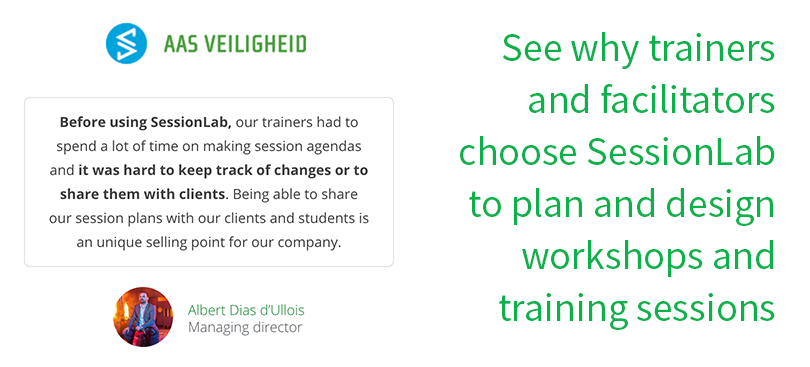
Are you using any offline facilitation tools? Let us know what your favourite ones are in the comments!
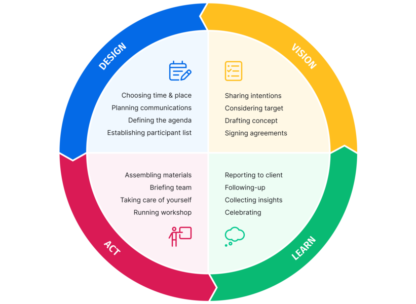
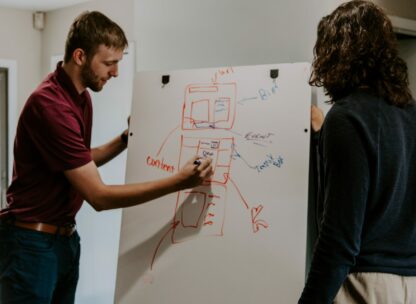
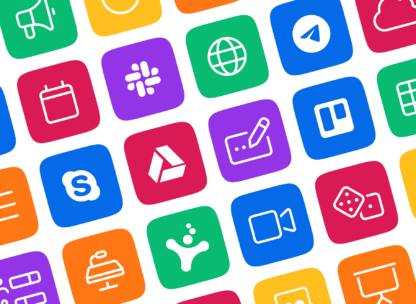
Leave a Comment